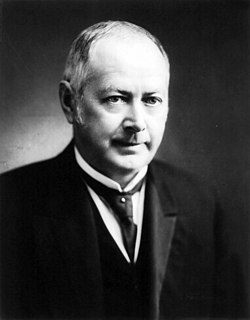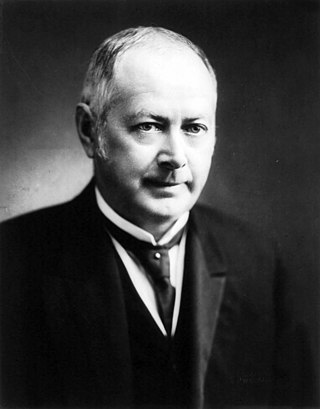Albert S. Burleson
American politician (1863–1937) From Wikipedia, the free encyclopedia
Albert Sidney Burleson (June 7, 1863 – November 24, 1937) was a progressive Democrat who served as United States Postmaster General and Representative in Congress. He was a strong supporter of William Jennings Bryan and Woodrow Wilson and so Wilson appointed him to the cabinet role heading the U.S. Post Office. He expanded parcel post, rural free delivery, and air mail service. After America entered World War I in 1917, he stopped the mail delivery of anti-war publications and clamped down on free speech, actions that have been heavily criticized ever since.
Albert Burleson | |
|---|---|
 | |
| 45th United States Postmaster General | |
| In office March 5, 1913 – March 4, 1921 | |
| President | Woodrow Wilson |
| Preceded by | Frank H. Hitchcock |
| Succeeded by | Will H. Hays |
| Member of the U.S. House of Representatives from Texas | |
| In office March 4, 1899 – March 6, 1913 | |
| Preceded by | Joseph D. Sayers |
| Succeeded by | James P. Buchanan |
| Constituency | 9th district (1899–1903) 10th district (1903–1913) |
| Personal details | |
| Born | Albert Sidney Burleson June 7, 1863 San Marcos, Texas, C.S. |
| Died | November 24, 1937 (aged 74) San Marcos, Texas, U.S. |
| Political party | Democratic |
| Education | Texas A&M University Baylor University (BA) University of Texas at Austin (LLB) |
Early life
Born in San Marcos, Texas, Burleson came from a wealthy Southern planter family. His father, Edward Burleson, Jr., was a Confederate officer. His grandfather, Edward Burleson, was a soldier and statesman in the Republic of Texas and the early State of Texas. In his early political career, Burleson represented Texas in the House of Representatives, where he was active in promoting the development of agriculture.[1] According to his biographer Adrian Anderson, his 1898 platform showed:
evidences of agrarian liberalism. He called for a reduction in the tariff, prison terms for violators of antitrust laws, restriction of immigration, limitations on the use of injunctions against labor unions, and a national amendment allowing the enactment of an income tax. He denounced national banks and repeated his plea for free coinage of silver.[2]
Postmaster General
Summarize
Perspective


Burleson played a major role in securing the Texas delegation for Woodrow Wilson in 1912, and he became one of the President's most trusted advisors.[3] In 1913, he was appointed Postmaster General. To his credit, he initiated the parcel post and air mail services, increasing mail service to rural areas.[4] Samuel Walker states, "Burleson holds the dubious distinction of being the worst member of the entire Wilson administration on civil liberties."[5] According to historian G. J. Meyer, Burleson "has been called the worst postmaster general in American history, but that is unfair; he introduced parcel post and airmail and improved rural service. It is fair to say, however, that he may have been the worst human being ever to serve as postmaster general".[4]
In 1913, Burleson began segregating the postal employees by race. Burleson also fired black postal workers in the South. He drew criticism from labor unions by forbidding postal employees to strike.[6]


In 1913, Burleson aroused a storm of protest, especially on the part of the large daily newspapers, by declaring that he would enforce the law requiring publications to print, among other things, a sworn statement of paid circulation, which had been held in abeyance by his predecessor until its constitutionality might be confirmed. The Supreme Court enjoined him from doing so.[7]
After the United States entered the World War in 1917, Burleson vigorously enforced the Espionage Act, ordering local postmasters to send to him any illegal or suspicious material that they found. The distribution by mail of major anti-war magazines, such as Emma Goldman's Mother Earth and Max Eastman's The Masses, was slowed drastically, and often, were never delivered. Burleson banned anti-war material from being delivered by Post Office personnel. It was impossible to draw an ideal line, and the result was a general alienation of the press.[7] From June 1918 to July 1919, the Post Office Department operated the nation's telephone and telegraph services,[8][9] an arrangement Burleson had advocated at least as early as 1913.[10]
Following the war, he continued to advocate permanent nationalization of telephone, telegraph, and cable services. He acknowledged that Congress would be hostile to the idea, and he oversaw the return of the communications infrastructure to its various corporate owners.[11] He introduced the "zone system" in which postage on second-class mail was charged according to distance.[7]
Later life
In 1919, he was appointed as chairman of the United States Telegraph and Telephone Administration. In 1920, he became the chairman of the United States Commission to the International Wire Communication Conference and retired in 1921.[12]
In the 1930s, he opposed the Ku Klux Klan and supported Al Smith for president.[13] Burleson died of a heart attack and is buried in the Oakwood Cemetery, in Austin, Texas.[citation needed]
References
Further reading
External links
Wikiwand - on
Seamless Wikipedia browsing. On steroids.
